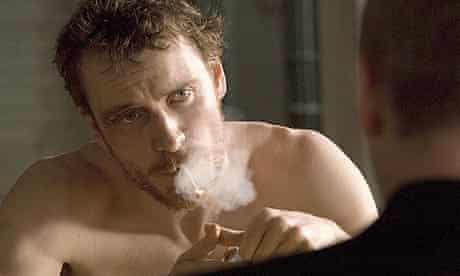Eye For Film >> Movies >> Hunger (2008) Film Review
Hunger
Reviewed by: Amber Wilkinson

Despite documenting events that happened 27 years ago, Steve McQueen’s first feature film is, perhaps surprisingly, very relevant today. It tells the story of life in Northern Ireland’s infamous H-Block in the Maze Prison during the "no wash" and "blanket" protests, which began in the late Seventies and lead to the 1981 hunger strike, in which Bobby Sands (here played by Michael Fassbender) starved himself to death.
With so many films concerned about torture in Guantanamo Bay (Taxi To The Dark Side) and Abu Ghraib (Standard Operating Procedure, The Ghosts Of Abu Ghraib), it is depressing to note that little has changed down the years, with early scenes depicting the systematic beating of inmates convicted of terrorism and their attempts to retaliate by way of smearing faeces over cell walls, swilling urine down the hallways and refusing to wear prison uniform.

Equally, the idea of someone’s body becoming a weapon, with which to send a political message, is (arguably) a key to modern acts of violence, as it has always been.
The artistry on display deserves all the plaudits it has received, including the Camera d’Or at Cannes. Turner Prize-winning artist McQueen, whose background lies in film installations, paints a poetic portrait of pain, perfectly balancing the camerawork and colour palette. Excretment-daubed walls of the prisoners’ cells, somehow rich and earthy despite the squalor, contrast with the stark cleanliness of the hallways patrolled by warders and the pale, goose-pimpled flesh of prisoners wearing nothing but blankets to protect them from the dirt. Cool white snow, falling on the dark suit of a prison officer, makes the blood, seeping from his knuckles, somehow alluring in its depth, as your mind baulks at how the injury came into being. Despite the filth, horror and desolation, McQueen’s portrait is a thing of brutal beauty in terms of its composition.
His carefully constructed script, co-written by Enda Walsh, feels like acts being played out, firstly a depiction of the prison and its inhabitants, followed by an examination of the "cause" and finally Sands's terminal decline. This means that some strands drop out of the narrative a little theatrically, but the director's purity of vision prevents things becoming overly stagey, with scenes of shocking, kinetic brutality mixed with episodes of more static debate.
Politically, the film is careful to show the multi-faceted aspects of the period. There is prisoner officer violence and riot squad beatings, but also a sense that those in charge are also human, living in fear of attack, or trying to cope with the affects of traumatic stress, brought on by working in such a volatile environment. While shown in gruelling detail, violence is presented in a matter-of-fact way, rather than indulged, as is all too common in Hollywood these days.
The performances never waver. Fassbender is a triumph, contrasting the zealot Republican, explaining his beliefs to a priest (Liam Cunningham - also terrific), with the husk of a man living out his final days in unspeakable agony. He is matched by Stuart Graham, as a prison officer, and Brian Milligan, as IRA prisoner Davey Gillen, better known for their TV and stage work, but effortlessy rising to the challenge of the larger screen.
Tough, brave and unexpectedly beautiful, Hunger is yet another British film in a slew of excellent recent debuts - (Better Things, Unrelated and last year’s Control) - that promise great things for our film industry in the years to come.
Reviewed on: 28 Sep 2008


















